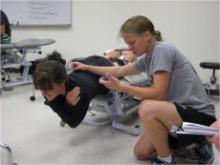Research Requirements
The ability to consume and produce research is an inherent element of graduate education. Lecture and laboratory work in this program are designed to foster the development of the necessary skills to both consume and produce research. PT6270, Research Methods I (first semester) and PT6271, Research Methods II (second semester) consist of material covering critical analysis, research design, and statistics. In addition, students will be required to complete a clinically relevant research project. The project designs will vary from year to year but will typically be one of the following: synthesis research (systematic review, scoping review, or narrative review), a secondary analysis of previously collected data, or primary research involving human subjects.
Each research project is developed by an individual faculty member or a Faculty Research Advisory Committee. If required, the research proposal will have already received approval from the Clinical Investigations Committee, Institutional Review Board, and the Commander of Brooke Army Medical Center. At the beginning of the program, the faculty research mentors will present their respective projects to the students. Students will then be assigned to one of the research projects in groups of three to four.
During the first semester, students complete literature review summary tables that summarize the literature relevant to the research project. Data collection is primarily conducted during the second semester. Analysis and interpretation of data occurs subsequently. The third semester is reserved for the preparation of multiple research dissemination products including: an abstract, a poster presentation, a platform presentation, and a final manuscript. All deliverables associated with the research curriculum are completed prior to beginning the clinical internship.
Research deliverables are graded as both an individual and a group effort. The grading is designed such that all students must demonstrate an understanding of their faculty-directed project, as well as adherence to sound scientific principles.
Class of 2024 Research Projects
- A systematic review of patient-reported outcome measures for individuals following concussion
- Psychosocial Factors Associated with High and Low Risk of developing Chronic Pain Six Months After Lower Extremity Fracture
- Early psychosocial factors are associated with pain and physical function outcomes throughout recovery from lower extremity fractures
- Performance-based outcome measures for individuals following a concussion: A Systematic Review
- Evidence Based Care in the Upper Crossed Athlete: A Narrative Review
- Virtual Rehabilitation and Monitoring via In-home Gaming for Patients with Patellofemoral Pain
- Movement Screening for Tactical Operations: A Scoping Review
- Do Psychological Factors, Time Since Surgery, or Strength and Proprioception Deficits Affect Landing Biomechanics Following Anterior Cruciate Ligament Reconstruction: A Secondary Analysis?
- Protocol Development: Relationship between running load rates and sound-intensity at impact
- Post-concussion return to range progression for service members: A Scoping Review
